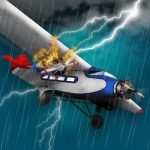
AUS Radar & Weather: WeatherAlert Free
Weather and Utilities
App
Get Australian Bureau of Meteorology (BOM) rain radar, weather, interactive maps, weather maps and...

Flight of the Amazon Queen: 20th Anniversary Edition
Games
App
"A great game, that'll give you hours of fun and leave you feeling good. We love it!" -Mr. Bill's...

Video Calls with Santa
Lifestyle and Entertainment
App
* #1 CHRISTMAS APP IN AMERICA * * TOTALLY UPDATED FOR 2017 * * TOP 100 IN OVER 50 COUNTRIES * * NO...

AUS Radar & Weather: WeatherAlert
Weather and Utilities
App
Get Australian Bureau of Meteorology (BOM) rain radar, weather, interactive maps, weather maps and...

Weather 14 days Pro
Weather and Travel
App
Ad free version! Weather 14 Days provides detailed weather information for USA and the rest of the...

30 Day Fitness Challenge Log
Health & Fitness and Lifestyle
App
Are you ready for the 30 Day Fitness Challenge? Accept the challenge to see tangible results and get...

MyPostcard Photo Postcard App
Travel and Photo & Video
App
Send real printed photo postcards and greeting cards with the MyPostcard Postcard App worldwide. No...

Jason Vale’s Super Fast Food
Food & Drink and Health & Fitness
App
THE WORLD’S NUMBER 1 NAME IN JUICING BRINGS YOU HIS FIRST EVER WHOLE-FOOD RECIPE APP! * OVER 4...

Integrative Veterinary Care Magazine
Education and Magazines & Newspapers
App
30-day FREE trial with every new subscription purchased in the IVC Journal app. IVC Journal...
